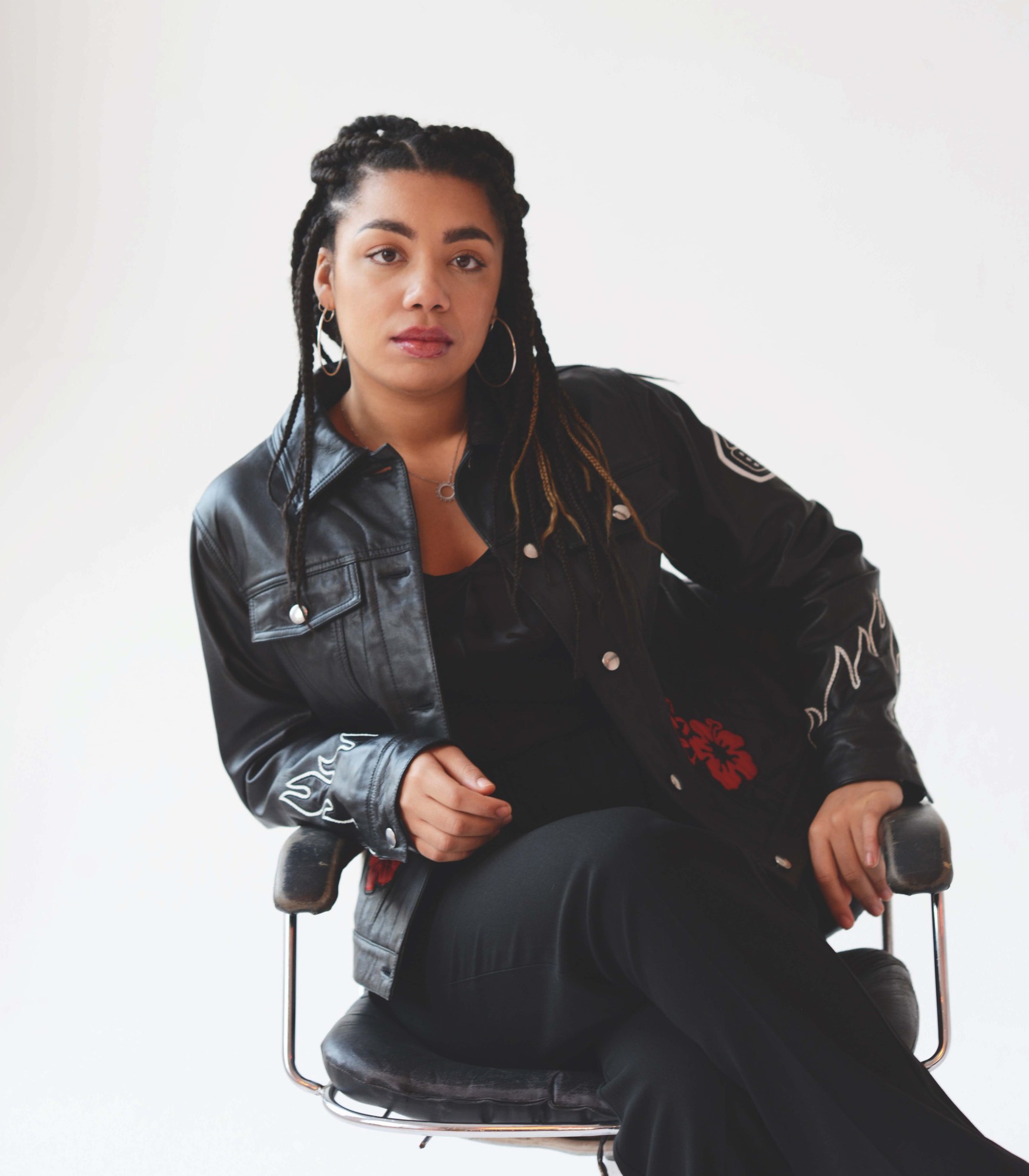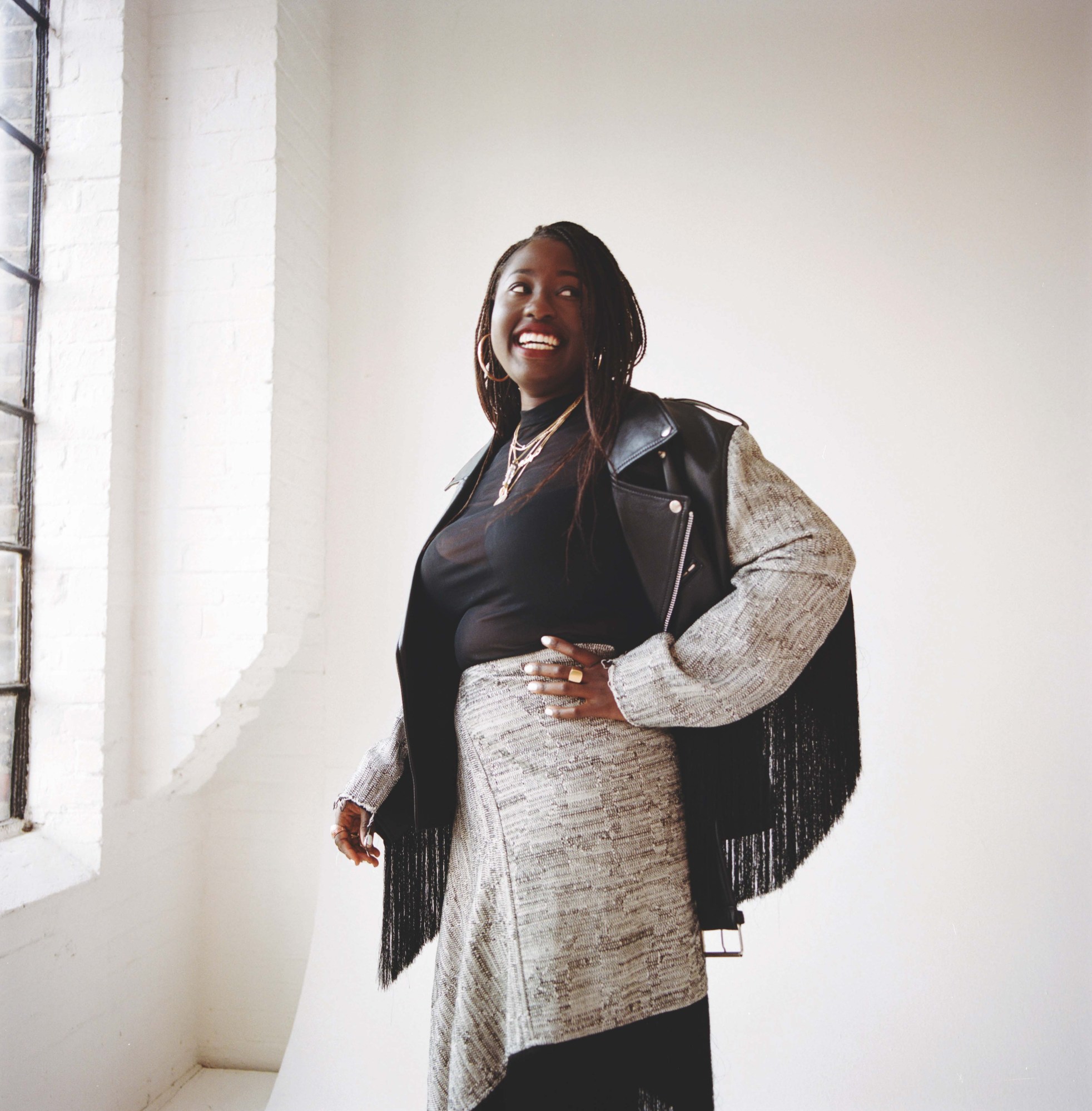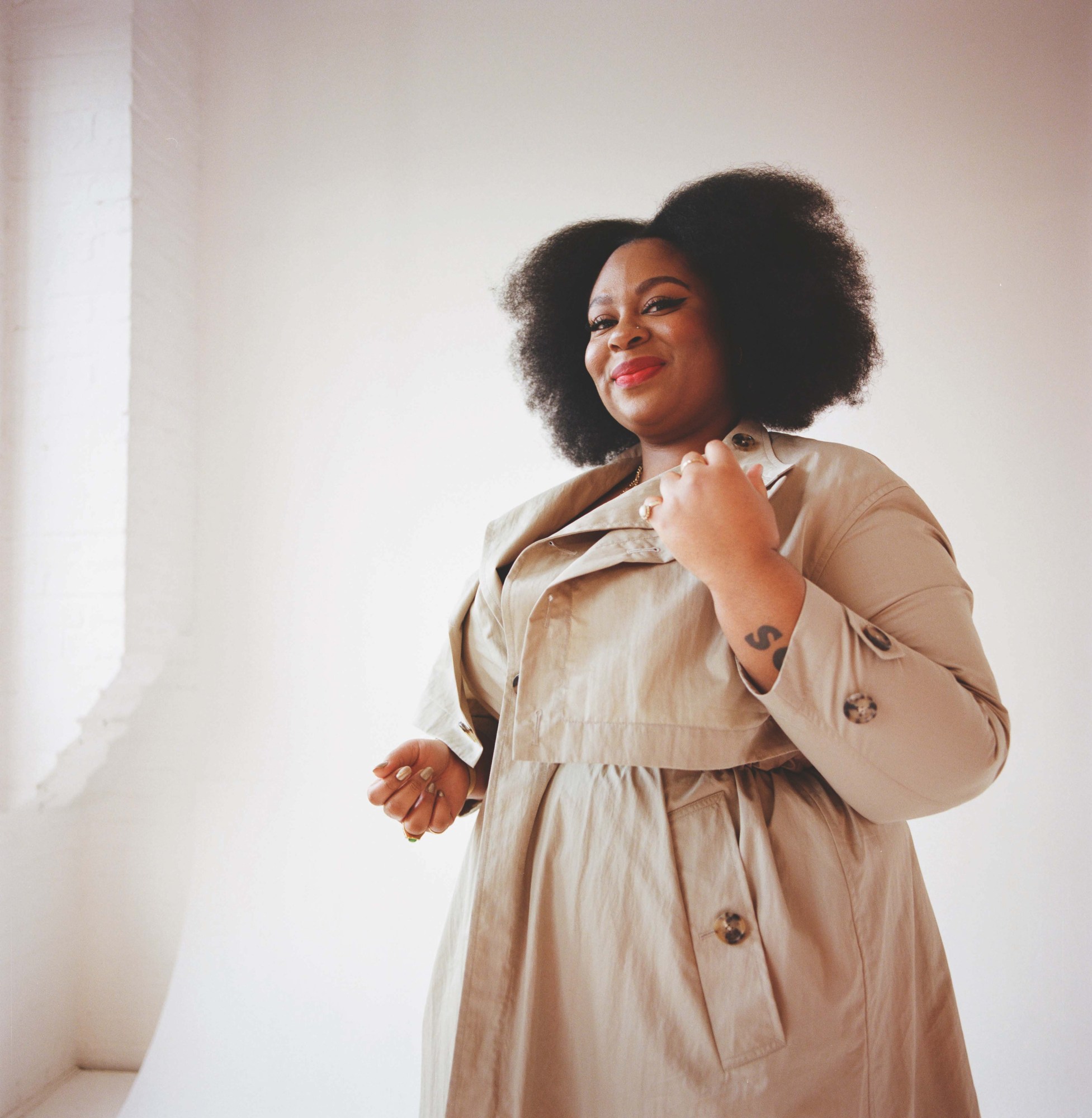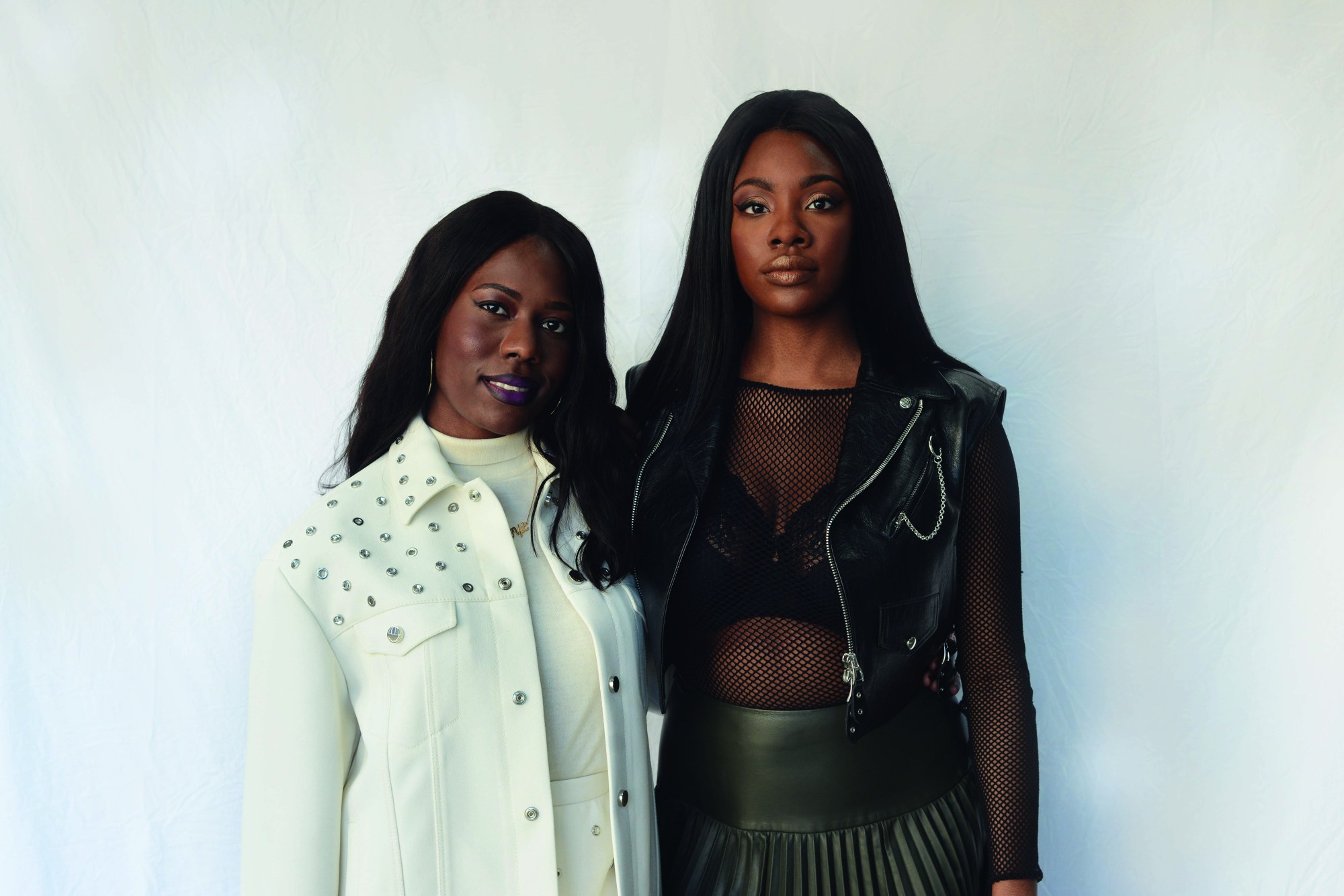This story originally appeared in i-D’s The Homegrown Issue, no. 355, Spring 2019.
Elizabeth Uziebinené & Yomi Adegoke (above)
If there’s one word to describe the energy that Yomi Adegoke and Elizabeth Uziebinené channel, it’s unapologetic. “We’re used to navigating spaces that are not necessarily set up for us to excel in,” Elizabeth states on the decision to make ‘Black Girl Bible’ the subtitle for their book, Slay In Your Lane. Yomi agrees, and if years of working in the media have taught her anything about discussing race candidly, it’s “if we’re going to do this, we have to do it properly.” Worrying about alienating people is a two-pronged failure, not only do you dilute your message to the wider audience, but you also tend to undermine the demographic you were trying to reach in the first place. Both things they avoided doing with Slay In Your Lane. Together, they make up the power duo behind one of the most buzzed about book releases of 2018: an inspirational guide to life and success as black British women in 2018. With clips and tips from industry-spanning figures such as author Malorie Blackman through to space scientist Dr. Maggie Aderin Pocock and presenter Clara Amfo, the book is a hub of inspirational women and their stories, aiming to provide young black woman with the tools they need to live their best lives. They both emphasise their desire to amplify the voices of other black British women. “We see ourselves as the vehicle for these amazing women’s stories.” In that respect, Slay In Your Lane is merely the first step in opening up a dialogue in which young black woman feel not only validated but inspired to persist. Yomi’s favourite learning from the book embodies this perfectly: “Vanessa Kingori [Publishing Director of British Vogue] says ‘we’re going to stick out anyway, there’s no point trying to hide.’” It’s a statement that champions harnessing that difference that is already inherent to black woman in British society and using it to remain authentic and stand out in a positive way. It’s that very same sentiment, at the core of the Slay In Your Lane ethos.

Charlie Brinkhurst-Cuff
It’s impossible for things not to feel timely, in the wake of Brexit, Trump’s anti-immigrant policies, and of course the Windrush Scandal, but Charlie Brinkhurst-Cuff’s book Mother Country could not be more necessary. Exploring both the immediate and long term effects of a perfect storm of political dishonesty, xenophobia and selective amnesia, it is an at-times uplifting, often-heartbreaking record of multiculturalism and mistreatment of the children of the Windrush Generation. With 22 stories from the likes of Lenny Henry, Corinne Bailey-Rae and David Lammy, the complexities of the British migrant experience are painted vividly across the book. “I was really passionate about telling the stories of Caribbean migrants who came to this country, but also disrupting and challenging some of the dominant narratives around that particular journey.” Describing her own role in collating and shaping these histories as that of a ‘vessel’, her ear and attention is palpable.One of the most affecting stories is that of Joy Gardner. It’s the chilling story of a mother who died in 1993 as a result of injuries sustained through violent arrest by UK police officers in front of her then five-year-old son. To make it worse, all officers involved in the incident were acquitted of charges. Another standout comes from Maria del Pilar Kaladeen, unpacking the more insidious effects of the hostile environment on the mental health of many. It’s no secret that unless change occurs, reflecting on the mistakes and patterns of the past, often serves as a warning or forecast for the future. The topics at the centre of Charlie’s book are both timeless and universal: raising questions of identity and belonging, justice and redemption.

Emma Dabiri
If there’s someone you want in your corner on the Twitter feed, when you’ve accidentally ended up in a heated debate with an influencer about why their “boxer braids”, adult-sized baby hairs and copious fake tan are not a good look, it’s Emma Dabiri. Taking multi-hyphenate culture to new levels, the author, presenter, academic, mother and former-model boasts an impressive academic background in African Studies and routinely uses her voice to ground today’s conversations about race and gender with socio-historical context.“I really don’t believe that information and knowledge should be kept within the Ivory Tower of academia,” Dabiri explains as we discuss the way in which political discussions seem to play out in the age of social media in response to current affairs and pop culture. Keeping our history accessible and current is also the inspiration for her upcoming book Don’t Touch My Hair. For black women, hair has been central to not just how we see beauty but also care for ourselves. In Don’t Touch My Hair Emma chronicles “the untold innovation in black hairstyling” as a blueprint for decolonisation, with the goal of equipping us with the hard evidence to dispel the dismissive sentiment often used to gaslight black women’s experiences today, that it is in fact, ‘just hair’. Born to a Nigerian father and Irish mother, Dabiri grew up as a young black girl in a starkly homogeneous ( read white) society in Dublin, where she says casually, “if people were trying to be polite, they would just refer to me as ‘the dark one’”. Afterwards, she went on to spend a lot of time in Atlanta and is now based in London. Navigating a range of communities since childhood, Emma is uniquely versed in the nuances of identity relations within a number of spaces, and her journey with identity and beauty reflects that. “The world communicates a message that beauty is of all importance”, freeing yourself of that for Emma looks like two things: firstly, rejecting the natural obsession with beauty and appearances as altogether unhealthy, and secondly, reprogramming exactly what and, importantly, who that definition extends to.

Bridget Minamore
South London poet and writer Bridget Minamore is a veteran of the London literary scene. Her path through poetry – much like her written and spoken voice – has always been incredibly natural. Since adolescence, Bridget has been writing as a hobby, taking part in programmes and entering competitions, before touring and performing her poetry live. Her collection of poetry, Titanic, is a deeply intimate collection of poems exploring the highs and lows of relationships, with all their modern-day toxicity, vulnerability and often ambiguity. Comprised of 25 short first-person poems and titled with bittersweet pop cultural references, Minamore’s writing at times resembles an ice bath in its startling yet refreshing honesty. But to bare all in such a frank manner as she does within her work is no small feat. When we touch on the intimidating prospect of being that open, Bridget admits that she never fully grasped what it would mean to publish these poems until after the fact. “I definitely didn’t realise how vulnerable I’d feel.” The poems in the collection were initially written from a place of personal catharsis, without an audience in mind, and so releasing them into the world, subject to analysis and dissection was definitely a shock to the system for her. Fortunately, she’s made peace with the fact that the poems are what they are as a result of this. Had she been more conscious of the things people would draw from them, perhaps they would not have been so raw and transparent. Bridget reflects on the whimsical nature of using song lyrics as titles and the ability to detach herself from the voice in many of the poems, “I definitely see the lies in them now, and also the truth. To me, it was the epitome of an unreliable narrator”. Titanic is a snapshot in time and fantasy. Much like one’s own stream of consciousness, they are the unfiltered inner workings of someone infatuated with the romance of romance: “It’s less a book about different relationships and more about a person’s relationship with relationships.”

Candice Carty-Williams
“I used to get kicked out of class a lot at school for asking questions,” Candice Carty-Williams admits with an audible sigh of injustice, as she explains her serendipitous journey into books. When teachers lost their patience with her in class she would find solace in the library. And it was those very library moments that fuelled her love of literature. “I realised that books were something I could contribute to,” she says. Whilst in her first publishing job at 4th Estate, she had the idea to establish one of the UK’s first inclusive publishing initiatives, arriving at work one day with a proposal for what became the BAME Short Story Prize in collaboration with The Guardian, at the ripe age of 23. Six years of tireless work for representation later, Candice decided to take matters into her own hands and write a story that reflected the life of her and her friends. “I wrote Queenie because I was bored of the lack of representation of black girls. My job is to represent.” And that’s exactly what her debut novel sets out to do. Published by Orion this spring, and centering around a 25-year-old Jamaican-British woman living in London, Queenie is a novel dedicated to the untold stories of those living between cultures. Raised in traditional immigrant households before being thrust into directly opposing western environments, all the while realising that you fit into neither. “I’ve never seen myself as a central lead character in anything, so I was putting myself as a secondary character in my own life.” If our imagination is an extension of the world we see, then to center ourselves in our own stories is to reclaim narrative control, step into the limelight and redefine the boundaries of what it means to be a young woman in London in 2019. At a time where we are finally witnessing the bubblings of diverse and nuanced representations, mainly online or on TV, Candice’s debut novel is a stride forward to ensure that the same goes for what sits on the shelves.
Credits
Photography Ekua King
Styling Jeanie Annan Lewin
Hair Cathy Ennis using Aveda. Make-up Mata Lab Using M.A.C Cosmetics, Givenchy Beauty and Ardel Lashes UK. Fashion Assistance Bongeka Dube. Make-up assistance Gracy BH. Models Candice Carty Williams, Charlie Brinkhurst, Em Dabiri and Bridget Minamore.
